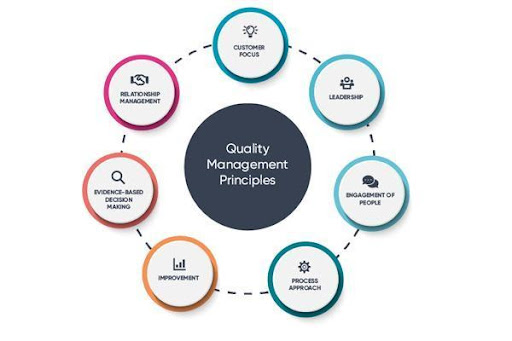What are the seven quality management principles?

If you have recently browsed the net looking for anything related to ISO 9001, you must have come across the term, “quality management principles.” The net is filled with articles that rave about how beneficial ISO 9001 is for organisations because it incorporates quality management principles into the company’s operations. However, have you ever wondered what quality management principles actually are? Let us have an honest discussion about quality management principles, their importance and why they are incorporated in ISO 9001.
Table of Contents
What is a quality management principle?
Without getting into the technical jargon, a quality management principle is an idea around which the operations of quality assurance are created. Essentially, the management is told to remember this idea or approach when they are creating policies or objectives for the Quality Management System (QMS). The rationale behind incorporating the quality management principles into daily operations is that by keeping a specific focus, the company is able to assure that the quality of their products or services does not deteriorate.
To explain this further, let us take the example of customer focus, one of the core quality management principles. If a company remembers to keep “customer focus” at the core of all its objectives and policies, it will ensure that all the deliverables match the requirements of the customers. As a consequence of creating products or services that match the customer requirements or keeping the customer at the focus during production, the products and services remain high-quality.
Another important characteristic of a quality management principle is that it gives a lot of liberty to organisations. Organisations have the liberty or freedom to interpret the principle as per their circumstance. Taking the example of customer focus, the requirements of customers will differ from organisation to organisation, however, remembering to keep customer focus at the core of all policies allows organisations to maintain their quality.
Therefore, another way of describing a quality management principle is to say that it is an approach that pushes a quality-first environment in an organisation.
ISO 9001 and quality management principles
ISO 9001 was created with the sole purpose of guiding organisations into improving their quality. The goal of this standard was to be so adaptable that any organisation, irrespective of its scope or complexity, could easily assimilate its recommendations.
Hence, quality management principles and ISO 9001 became the perfect marriage as they both aimed at improving quality, while remaining flexible. As mentioned above, quality management principles are flexible and are created to act as a guiding principle, helping organisations not lose focus of its quality objectives. You can use ISO consulting services to get more information and answers of your quastions about quality management principles.

What are the seven quality management principles?
Let us discuss the seven quality management principles of ISO 9001 in detail:
1.Customer focus
As mentioned above, the principle of customer focus helps organisations, remember that at the end, their products and services will only sell if the customer likes them. Hence, while designing the products/services, producing them, checking them for non-conformances, delivering them, it is necessary to remember the requirements of the customer. Lastly, it is also recommended to put into practice a process that sorts through all the feedbacks provided by the customers, so as to modify their current practises.
2.Process approach
Process approach helps to mitigate any logistical problems that can arise from confusion regarding ambiguity related to workflows, roles or responsibilities. A process-driven approach essentially means that organisations should develop appropriate processes for every area of the business, resulting in cost effective and consistent results as the entire organisation becomes one harmonious organism with interconnected networks.
3.People involvement
This approach reminds organisations that their greatest asset is and always will be their employees. This principle dictates that the feedback of employees should be regularly incorporated into the daily practises, so as to motivate and engage them. As a result of regular engagement, employees feel indispensable and valuable, thereby aligning to wider company objectives.
4. Leadership
Managing implies delegating daily tasks, whereas leadership refers to inspiration. If the leaders are truly inspired and are working towards creating good quality products or services, then their enthusiasm will be transpired to all employees. Leaders must showcase their commitment by spending time with their employees, promoting the vision, providing adequate resources and being authentic.
5.Mutually beneficial supplier relationship
The principle of relationship management reminds organisations that they cannot survive in isolation. By maintaining their relationships with suppliers, organisations can react more quickly and flexibly to new customer demands. Relationship management is directly related to sustainability and long preservation, hence this principle urges organisations to become harmonious with all their partners.
6.Evidence based decision making
Decisions that are embedded in facts or evidence, create effective, sustainable, efficient and viable results. This principle urges managers to remove all guesswork from their decision making.
7.Continual improvement
Constant progress is a permanent goal for any organisation and the commitment to improvement showcases to all stakeholders that you aim to become a market leader. This principle urges the top management and leaders to constantly evaluate their processes to identify strengths and weaknesses as well as areas that can make these operations more efficient.
Conclusion
Quality management principles are guiding principles that help the organisation maintain and foster a quality first environment in their business. These principles include continual improvement, evidence based decision making, relationship management, leadership commitment, employee engagement, process approach and customer focus.
For any important information please contact us Email GadgetsNg info@gadgetsng.com
[Button id="1"]


Your style is very unique compared to other people I’ve read stuff from.
Thank you for posting when you’ve got the opportunity, Guess I will just book mark this web site.
Very good information thanks so much!